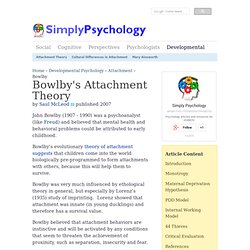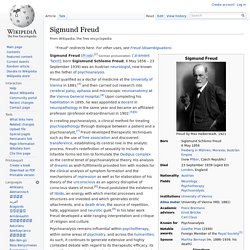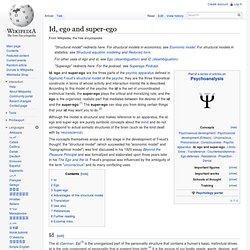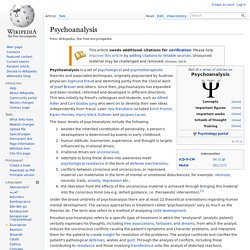

Maternal Deprivation Theory. By Saul McLeod published 2007 John Bowlby (1907 - 1990) was a psychoanalyst (like Freud) and believed that mental health and behavioral problems could be attributed to early childhood.

Bowlby’s evolutionary theory of attachment suggests that children come into the world biologically pre-programmed to form attachments with others, because this will help them to survive. Bowlby was very much influenced by ethological theory in general, but especially by Lorenz’s (1935) study of imprinting. Lorenz showed that attachment was innate (in young ducklings) and therefore has a survival value. Bowlby believed that attachment behaviors are instinctive and will be activated by any conditions that seem to threaten the achievement of proximity, such as separation, insecurity and fear. Bowlby (1969, 1988) also postulated that the fear of strangers represents an important survival mechanism, built in by nature. 10 Psychological Experiments That Went Horribly Wrong. Psychology as we know it is a relatively young science, but since its inception it has helped us to gain a greater understanding of ourselves and our interactions with the world.

Many psychological experiments have been valid and ethical, allowing researchers to make new treatments and therapies available, and giving other insights into our motivations and actions. Sadly, others have ended up backfiring horribly — ruining lives and shaming the profession. Here are ten psychological experiments that spiraled out of control. 10. Sigmund Freud. Sigmund Freud (/frɔɪd/;[2] German pronunciation: [ˈziːkmʊnt ˈfʁɔʏ̯t]; born Sigismund Schlomo Freud; 6 May 1856 – 23 September 1939) was an Austrian neurologist, now known as the father of psychoanalysis.

Freud qualified as a doctor of medicine at the University of Vienna in 1881,[3] and then carried out research into cerebral palsy, aphasia and microscopic neuroanatomy at the Vienna General Hospital.[4] Upon completing his habilitation in 1895, he was appointed a docent in neuropathology in the same year and became an affiliated professor (professor extraordinarius) in 1902.[5][6] Psychoanalysis remains influential within psychotherapy, within some areas of psychiatry, and across the humanities. As such, it continues to generate extensive and highly contested debate with regard to its therapeutic efficacy, its scientific status, and whether it advances or is detrimental to the feminist cause.[10] Nonetheless, Freud's work has suffused contemporary Western thought and popular culture. Id, ego and super-ego. Although the model is structural and makes reference to an apparatus, the id, ego and super-ego are purely symbolic concepts about the mind and do not correspond to actual somatic structures of the brain (such as the kind dealt with by neuroscience).

The concepts themselves arose at a late stage in the development of Freud's thought: the "structural model" (which succeeded his "economic model" and "topographical model") was first discussed in his 1920 essay Beyond the Pleasure Principle and was formalized and elaborated upon three years later in his The Ego and the Id. Freud's proposal was influenced by the ambiguity of the term "unconscious" and its many conflicting uses. Id[edit] According to Freud the id is unconscious by definition: In the id, "contrary impulses exist side by side, without cancelling each other out. ... Developmentally, the id precedes the ego; i.e., the psychic apparatus begins, at birth, as an undifferentiated id, part of which then develops into a structured ego. Psychoanalysis. Psychoanalysis is a set of psychological and psychotherapeutic theories and associated techniques, originally popularized by Austrian physician Sigmund Freud and stemming partly from the clinical work of Josef Breuer and others.

Since then, psychoanalysis has expanded and been revised, reformed and developed in different directions. This was initially by Freud's colleagues and students, such as Alfred Adler and Carl Gustav Jung who went on to develop their own ideas independently from Freud. Later neo-Freudians included Erich Fromm, Karen Horney, Harry Stack Sullivan and Jacques Lacan. The basic tenets of psychoanalysis include the following: Under the broad umbrella of psychoanalysis there are at least 22 theoretical orientations regarding human mental development. Psychoanalysis has received criticism from a wide variety of sources.
History[edit] 1890s[edit] The idea of psychoanalysis first started to receive serious attention under Sigmund Freud. Albert Bandura. Albert Bandura (born December 4, 1925) is a psychologist who is the David Starr Jordan Professor Emeritus of Social Science in Psychology at Stanford University.

For almost six decades, he has been responsible for contributions to many fields of psychology, including social cognitive theory, therapy and personality psychology, and was also influential in the transition between behaviorism and cognitive psychology. He is known as the originator of social learning theory and the theoretical construct of self-efficacy, and is also responsible for the influential 1961 Bobo doll experiment. A 2002 survey ranked Bandura as the fourth most-frequently cited psychologist of all time, behind B. F. Bobo doll experiment. The Bobo doll experiment was the collective name of the experiments conducted by Albert Bandura in 1961 and 1963 studying children's behavior after watching an adult model act aggressively towards a Bobo doll.

There are different variations of the experiment. The most notable experiment measured the children's behaviour after seeing the model get rewarded, punished or experience no consequence for beating up the bobo doll. This experiment is the empirical demonstration of Bandura's social learning theory. It shows that people not only learn by being rewarded or punished itself (behaviorism), they can learn from watching somebody being rewarded or punished, too (observational learning). These experiments are important because they sparked many more studies on the effects of observational learning and they have practical implication, e.g. how children can be influenced watching violent media. The Bobo doll[edit] Locus of control. In personality psychology, locus of control refers to the extent to which individuals believe that they can control events that affect them.
Understanding of the concept was developed by Julian B. Rotter in 1954, and has since become an aspect of personality studies. A person's "locus" (Latin for "place" or "location") is conceptualized as either internal (the person believes they can control their life) or external (meaning they believe that their decisions and life are controlled by environmental factors which they cannot influence, or by chance or fate).[1] Individuals with a high internal locus of control believe that events in their life derive primarily from their own actions: for example, when receiving test results, people with an internal locus of control would tend to praise or blame themselves and their abilities, whereas people with an external locus of control would tend to praise or blame an external factor such as the teacher or the test.[2]